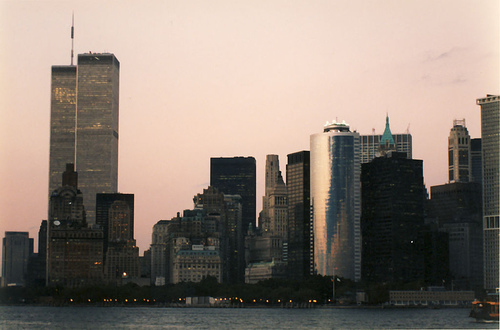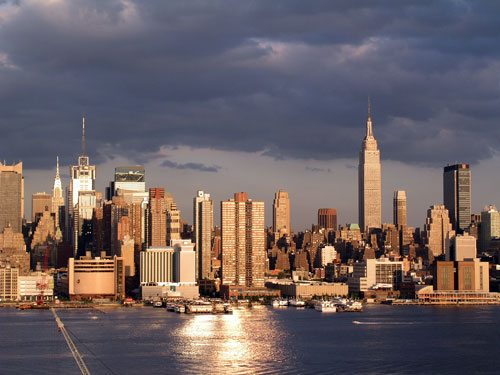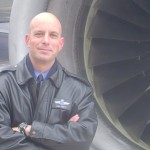Essay by Ken Hertz
Then and Now, a Pilot Tries to Explain the Unexplainable
December 2001
To those of us for whom flight is a passion, an airplane is more than just another mode of transportation. When we hear one passing overhead, we can’t help but turn and look, and wonder at the realization of our ancestors’ dreams to fly like the birds.
On September 11, that dream became a nightmare. It seems beyond our ability to logically process what we have seen: these majestic flying machines used by terrorists as a force for pointless destruction. The usual tools, our language and past experience, are simply not up to the task.
My first thoughts that day were of the people on those airplanes. I thought of how, when I have a free moment from my cockpit duties and am able to stand and greet our passengers, most smile as they file on board. Some are relaxed, others harried. Some are nervous and look at us searchingly, knowing they are entrusting us with their lives.
As I watched those surreal images on television of airliners crashing into the World Trade Center, I thought of the students and businesspeople, the elderly couples and young families, the hundreds each day who are under our care for a brief moment in their busy lives.
For some reason, an image stuck in my mind from one of my flights a few days prior. It was of a young mother, cradling her newborn infant as she walked onto the plane.
The vast majority of my fellow crewmembers continue to go quietly about the business of flying with consummate professionalism. We take some comfort in the disciplined regimen of checklists and procedures. Our focus is first and foremost on safety, as always. But something feels unfamiliar, now that our cockpit doors have been reinforced, and every passenger must necessarily be viewed as a potentially deadly foe. If September 11 changed everything, I wonder if we know just yet how different things really are.
• • •
Nearly ten years ago, I wrote those words.
Looking back, I can remember how I felt compelled to put thoughts down on paper, drawn to writing as a way to make sense of the events of September 11.
I lived in New York at the time, having moved from downtown Manhattan to Long Island just a month before the attacks. That summer, I had attended a wedding reception at Windows on the World, at the top of the North Tower of the World Trade Center. As an airline pilot, I gazed daily from my aerial vantage point at the skyline of the city I loved.
Like many, I was grasping for a way to understand what had happened. In the weeks and months following the tragedy, I read the profiles of the victims in the New York Times and wondered how many of them would have answered in the affirmative if they’d been asked at dawn on that September morning whether they were living their lives to the fullest.
I began to question whether I was living with meaning and purpose. I loved being a pilot, but what did that do, really, to advance humanity?
I wanted to write things down…no, I needed to write things down to clarify my thoughts. To put this thing, this new reality, this new state of existence—or whatever it was—into some kind of context.
In the past, I had sometimes reached for a pen when I had some new experience that I thought would make a good seed for a writing project. I had a drawer full of notebooks and scraps of paper filled with these scribbles from over the years. I planned to sift through it all and create something great—a memoir? a novel?—someday.
But the act of writing itself seemed invested with new urgency. I questioned my prior writing goals: Would it even be okay to write about seemingly trivial subjects? Did the very fact of 9/11—starkly visible to me in the form of a still-smoldering hole in the city as I flew down the Hudson—now mean that every writing effort must be directed toward producing a work of larger importance, something with the gravitas to match the era in which we now found ourselves living?
The novelist Haruki Murakami, in his 2008 memoir What I Talk About When I Talk About Running, writes:
Perhaps I’m just too painstaking a type of person, but I can’t grasp much of anything without putting my thoughts in writing, so I had to actually get my hands working and write these words. Otherwise, I’d never know what running means to me.
That a successful, prolific writer like Murakami uses writing as a tool not just for artistic expression but for deeper understanding of a subject of great personal importance is testament to the cathartic power of the writing process.
We all need to “get our hands working” and to keep them working. For if it’s true that an event such as 9/11 is a wake-up call, reminding us of the ephemeral nature of existence and quietly prodding us to get to work on the things that matter, it’s equally true that we can soon slip into old habits of thought that are contrary to what we wish to accomplish.
I returned to work a week after September 11. It’s never been easy to leave home for the required two- or three-day trip, but that first time back, it was heart wrenching to say good-bye—to kiss my wife and young daughter, who was then eighteen months old, to take up my flight kit and overnight bag. Here’s what I wrote in December 2001:
I didn’t fear for my personal safety, but I did feel the sense of separation more acutely than usual. If these tragedies have had any positive effect, it is to have made us all more aware of just how precious every moment of life is. That awareness makes us want to stay close to the ones we love.
In his memoir, Murakami writes with a lyricism that makes the act of running into a kind of mirror, reflecting his philosophy on life. As he puts it, “One thing I noticed was that writing honestly about running and writing honestly about myself are nearly the same thing.”
In flying, I’ve found a similar vein from which I can mine some essential truths. Attempting to write about my experiences aloft helps me to illuminate and clarify, in my own mind, some things I’ve observed as a pilot.
On a recent morning’s flight over New York at dawn, the view from the cockpit of my jet is sublime: a breathtaking panorama of a city awakening, its bridges and skyscrapers bathed in the soft gold and rose-colored hues of first light. It is an extraordinary tableau that I have seen a thousand times, and from a thousand different angles, in all the infinite variety of moods and weather that our ever-changing atmosphere provides.
Even now, ten years later, as I fly over the southern tip of Manhattan, I am also transfixed by the sight of what is no longer there: those two enormous towers, such potent symbols of strength and seeming permanence, existing only in my mind’s eye.
Such aesthetic riches—steeped in a kind of profound mystery—can’t really be explained with our poor language. But words are the only tools we have, so we keep trying.
Publishing Information
- What I Talk About When I Talk About Running by Haruki Murakami (Alfred A. Knopf, 2008).
Art Information
- “World Trade Center, Rose” © bidule.etrange; Creative Commons license
- “New York” © K. Connors; stock photo
Ken Hertz is an airline pilot who lives near Boston with his wife, three children, and a dog they brought home from Mexico.



